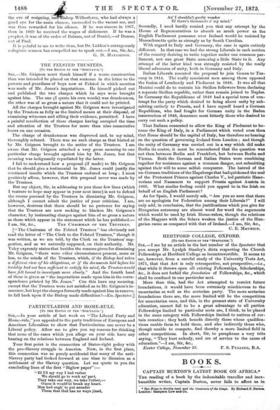PARTICULARISM AND HOME-RULE.
[TO THE EDITOR OF THE "SPECTATOR.."] SIR,—In your article of last week on "The Liberal Party and Home-rule," you appealed to the party traditions of European and American Liberalism to show that Particularism can never be a Liberal policy. Allow me to give you my reasons for thinking that none of the cases which you allege on your side have any bearing on the relations between England and Ireland.
Your first point is the connection of States-right policy with the pro-Slavery struggle in America. Now, in the first place, this connection was so purely accidental that many of the anti- Slavery party had looked forward at one time to disunion as a settlement of the Slavery question. Let me quote to you the concluding lines of the first "Biglow paper":— "El I'd my way I hod rather
We should go to work an' part.
They take one way, we take Vother — Guess it would'nt break my heart. Men hed ough' to put asunder Them that God has no ways jined, An' I shouldn't gretly wonder
Ef there's thousands o' my mind."
Secondly, I need hardly remind you that any attempt by the House of Representatives to absorb as much power as the English Parliament possesses over Ireland would be resisted by Ma.s%chusetts quite as strongly as by South Carolina.
With regard to Italy and Germany, the case is again entirely different. In that case we had the strong Liberals in each section of the country desiring to unite together under one common par- liament, not one great State annexing a little State to it. Any attempt of the latter kind was strongly resisted by the really liberal advocates of unity, both in Germany and Italy.
Italian Liberals resented the proposal to join Genoa to Tus- cany in 1814. The really consistent men among them opposed the fusion of Lombardy and Piedmont in 1848. It was all that Mazzini could do to restrain his Sicilian followers from declaring a separate Sicilian republic, rather than remain joined to Naples. In Germany the Republicans of 1848 had a special term of con- tempt for the party which desired to bring about unity by sub- mitting entirely to Prussia, and I have myself heard a German Republican, who had fought for German unity in the Baden insurrection of 1848, denounce most bitterly those who desired to carry out such a policy.
That Italians consented to allow the King of Piedmont to be- come the King of Italy, in a Parliament which voted even then that Rome should be the capital of Italy, has therefore no bearing on the question of governing Ireland from London ; and though the unity of Germany was carried out in a way which did make Berlin its centre, it must be remembered that the question was not then between Berlin and Frankfort, but between Berlin and Vienna. Both the German and Italian States were combining together for resistance against a common danger, not submitting against their will to some selfish conqueror. The hatred of the un-German traditions of the Hapsburgs that had quickened the zeal of the Protestant Princes against Charles V., led patriotic Hano- verians and Nassauers to support Prussia against Austria in 1866. What similar feeling could you appeal to in the Irish on behalf of an English Parliament?
As for Spain, I would merely ask, "Are you so sure that there are no apologists for Federation among their Liberals?" I will only add, in conclusion, that the justifications which you give for Hungarian autonomy are almost word for word the arguments which would be used by Irish Home-rulers, though the relations of the Magyars with the Sclays weaken the justice of the Hun- garian cause as compared with that of Ireland.—I am, Sir, &c., C. E. MAURICE.


































 Previous page
Previous page